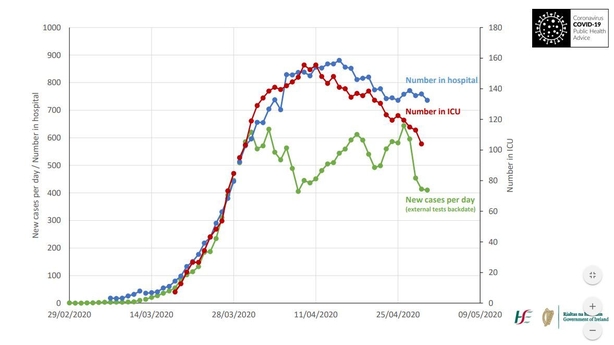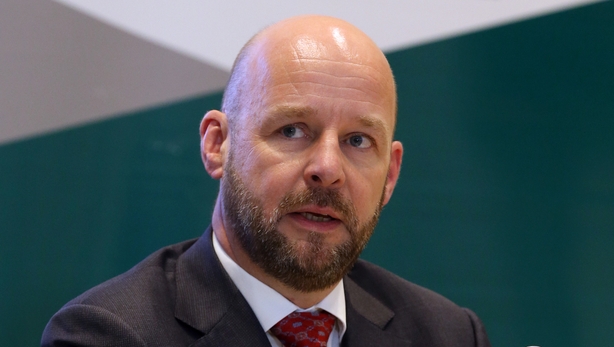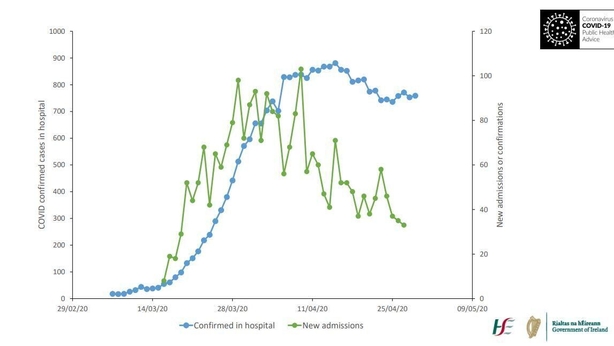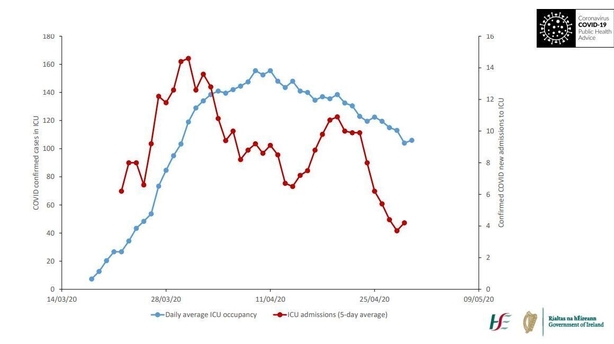The Department of Health has announced that a further 43 people who were diagnosed with Covid-19 have died.
It brings the overall death toll in Ireland to 1,232.
The department also confirmed 359 additional cases of the virus, bringing the overall number infected here to 20,612.
The latest data from the department as of midnight on Tuesday, when there were 20,111 cases, shows that healthcare workers account for over 5,684 of cases, a total of 28%.
More than 210 healthcare workers have been hospitalised. Of those, 34 were admitted to intensive care, and five of them have died.
The data shows that overall, 13% of cases have required hospitalisation, with 360 being admitted to ICU.
The median age of cases is 49, with a split of 58% female, and 42% male.
Almost 50% of cases are in Dublin, with Kildare and Cork next on 6% each.

Speaking at this evening's briefing, Chief Medical Officer Dr Tony Holohan said that of the cases involving healthcare workers, 34% relate to nurses, 24% relate to healthcare assistants, with cases among doctors accounting for 7%.
"Since the pandemic began in Ireland 72 nurses, 40 healthcare assistants, 22 doctors and 45 other allied healthcare workers have been hospitalised with Covid-19," he said.
Dr Holohan also said that the case has not arisen yet to give the team "a reason to believe that now is the time to lift restrictions", despite further improvement against the virus.
Dr Tony Holohan says the figures now do not suggest a reason for the NPHET to recommend an easing of restriction | Follow live updates: https://t.co/nJ98gXeFXL pic.twitter.com/lVjesuVLfJ
— RTÉ News (@rtenews) April 30, 2020
Dr Holohan said he wanted to avoid "taking a step and then taking a step backwards" when it came to easing restrictions.
He said he understood that cocooning was difficult and would not be in place "for any longer than was necessary".
Professor Philip Nolan, Chair of the Modelling Advisory Group to the National Public Health Emergency Team, said to understand the next steps needed in tackling the virus, we must look back to the outbreak's pattern back to March.
"Within ten days we went from 50 people in ICU to 140 people in ICU," he said.
He added: "Currently, there are 106 patients in ICU. If a similar surge occurred on top of our current ICU figure, we would find it very difficult to manage the treatment of patients.
"This reflects the sensitivity required in relaxing restrictions."
We need your consent to load this rte-player contentWe use rte-player to manage extra content that can set cookies on your device and collect data about your activity. Please review their details and accept them to load the content.Manage Preferences
Read more:
Interactive map: Covid-19 cases in your area
More than 70 complaints to GSOC over use of Covid-19 powers
New door opens against virus with anti-viral handle
Live coronavirus updates as they happen
Latest coronavirus stories
Prof Nolan said the number of new cases "rose very sharply" in the two weeks after schools and universities were closed, with about 450 people diagnosed with the virus each day in the week of 28 March.
Prof Nolan said there was a similar increase in the numbers of people who were hospitalised during that period.
He said that the introduction of more stringent restrictions "promptly choked off" the number of cases of the disease.
Prof Nolan said the number of people being hospitalised had plateaued at almost 900 by mid-April, and that there was a very sharp increase in the number of people being admitted to intensive care units in the period just after St Patrick's Day.

Prof Nolan also said that even though the number of people being diagnosed appeared to be static, the numbers were still "very significantly higher" than they were in March.
Prof Nolan said Covid-19 had entered long-term residential care "significantly later" than it had appeared in the general population.
He said the overall growth rate of the disease has now been close to zero since the start of April thanks to the strong social distance measures in place, however he said there was still a "very significant prevalence" of the illness in the general population.
Prof Nolan said the typical number of people in hospital had peaked at about 900 and was now at about 730.
He said the number of admissions to hospital per day had peaked at close to 100 and was now below 40, and the number of people in intensive care had peaked at almost 160 and was now down to just over 100.


He said he was optimistic that those numbers would reduce further, but said there was still a significant workload on the healthcare system.
Different countries have different strategies in tackling the virus, he said, which are "appropriate to their own contexts".
Comparing Ireland to Sweden, he said the Scandinavian country had a significantly smaller outbreak than Ireland at the time that restrictions were introduced here.
He said there was still "a huge amount of social distancing going on in Sweden".
The strategy adopted in Ireland did what it was supposed to do by stopping the spread of the disease, he said, because "we could not have coped with a further spread of the disease".
Dr Holohan added that it was too early to judge which strategies in which countries were most successful.
Earlier, Taoiseach Leo Varadkar told the Dáil that a plan is being developed to relax the current Covid-19 lockdown, but any easing of the restrictions will be done gradually.
He said he knew the lockdown was difficult and that people were feeling frustrated, cooped up and trapped, but he said "we must keep doing what we're doing".
He said public health and safety and healthcare capacity will continue to be the basis for decision-making.
Changes will be made every two to four weeks, but the Government will intervene if things are "going off track" and some elements would be reintroduced.
Health Minister Simon Harris says the Irish reproductive number for Covid-19 is 0.5 to 0.8. It is "quite an achievement by the people of this country", he says. | Follow live updates: https://t.co/nJ98gXeFXL pic.twitter.com/cFB94lqscx
— RTÉ News (@rtenews) April 30, 2020
It comes as Minister for Health Simon Harris has also warned that "extreme vigilance" will be required to contain the effects of Covid-19.
Speaking in the Dáil, Mr Harris said that he understands the fatigue people are feeling with the restrictions that are in place, but warned people must "guard against any sense of invincibility".
Mr Harris also told the Dáil that the reproductive rate – or 'R' number – of the virus has remained stable over the past week, staying at between 0.5 and 0.8.
